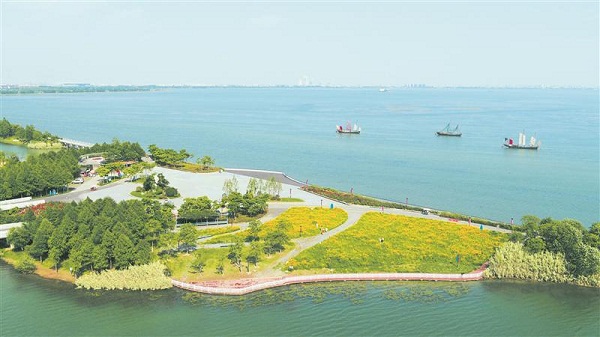
Taihu Lake [Photo/wxrb.com]
Wuxi's fight against water pollution in Taihu Lake, China's third-largest freshwater lake, has been the city's top priority over the past decade.
Statistics show that Wuxi has spent 72.2 billion yuan ($10.2 billion) to find innovative means to tackling pollution in Taihu Lake. As of the end of 2019, the lake's water quality reached category IV, meeting the national standard for general industrial water areas and recreational water areas that have indirect contact with people.
In addition, the water quality of 13 major rivers entering Taihu Lake and three tributaries of Yangtze River were found to be good (category I-III) for the first time. The proportion of key water function areas meeting national standards also reached 97.8 percent in 2019, meeting the national goals set for 2020 ahead of schedule.
About 60 percent of the dredging of Meiliang Lake was completed last October. The task, which is listed as an ecological pilot project by the State Council, aims to reduce internal pollution of the lake while promoting environmental protection. The construction tail water is discharged into the ecological purification area and treated sludge can be used for greening.
It has been six years since Yixing started to repair its wetlands along Taihu Lake in Dingshu town. The 3-kilometer-long Luwei Island, which covers an area of over 800,000 square meters, now acts as natural line of defense for Taihu Lake.
According to officials, Wuxi has collected 15.4 million tons of blue-green algae since 2007, about 90 percent of the total amount in Taihu Lake.
Wuxi has been employing new measures to deal with algae without harming the environment. These measures include employing the latest technological advancements to convert algae into resources such as organic fertilizer.
The newly-applied machines for collecting and treating algae in Honghuwan have been acting as mobile stations to separate 10,000 tons of algae and water each day. This has greatly improved working efficiency and ensured the water is potable.
Wuxi has also established a dynamic monitoring system for Taihu Lake and drinking water sources, checking water level, water quality and algae density in real time. The government said they will continue to prevent outside pollutants and work with surrounding cities on wetland construction and dredging work, with the aim to control water pollution and promote ecological restoration of Taihu Lake.